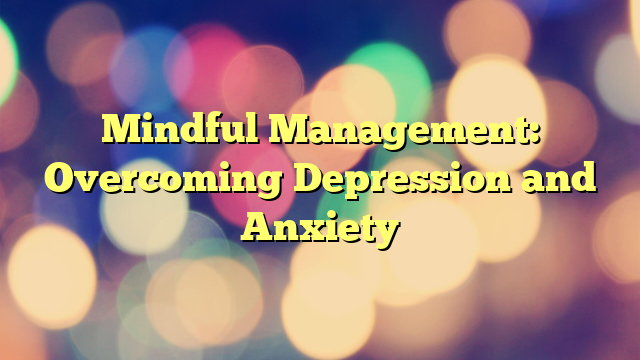Mindful Management: Overcoming Depression and Anxiety

Depression and anxiety are two common mental health conditions that affect millions of people worldwide. These conditions can have a significant impact on a person’s daily life, making it challenging to function and enjoy daily activities. However, with the right approach and mindful management techniques, it is possible to overcome these challenges and regain control over one’s mental well-being.
Understanding Depression and Anxiety
Depression is a mood disorder characterized by persistent feelings of sadness, hopelessness, and a loss of interest in activities. It can affect a person’s thoughts, emotions, and physical well-being. Individuals with depression may experience changes in appetite, sleep disturbances, and difficulty concentrating. Anxiety, on the other hand, is a condition marked by excessive worry, fear, and apprehension. It can manifest in various forms, such as generalized anxiety disorder, panic disorder, and social anxiety disorder. Anxiety can cause physical symptoms like rapid heartbeat, sweating, and shortness of breath.
The Importance of Mindful Management
Managing depression and anxiety requires a holistic approach that addresses various aspects of a person’s life. Mindfulness, a practice rooted in ancient Buddhist traditions, has gained recognition as an effective tool for managing these conditions. It involves maintaining a moment-to-moment awareness of thoughts, feelings, bodily sensations, and the surrounding environment without judgment.
By incorporating mindful management techniques into one’s daily routine, individuals can cultivate a greater sense of self-awareness and develop coping strategies to navigate through depressive and anxious episodes. Let’s explore some practical ways to incorporate mindfulness into your life.
1. Practice Mindful Meditation
Mindful meditation is a cornerstone of mindfulness-based interventions. Allocate a few minutes each day to sit quietly and focus on your breath. Pay attention to the physical sensations of breathing, the rise and fall of your abdomen, or the sensation of air passing through your nostrils. When your mind wanders, gently guide your attention back to your breath without judgment. Mindful meditation can help reduce rumination, improve emotional regulation, and increase self-compassion.
2. Engage in Mindful Movement
Physical activity is known to boost mood and alleviate anxiety. Engaging in mindful movement practices, such as yoga or tai chi, can have additional benefits. These practices encourage you to focus on your body’s movements, sensations, and breath, promoting a deeper connection between mind and body. Yoga, for example, combines physical postures with breath awareness and meditation, providing a holistic approach to managing mental health.
3. Cultivate a Gratitude Practice
Expressing gratitude has been linked to improved mental well-being. Take a few moments each day to reflect on things you are grateful for. Write them down in a gratitude journal or simply mentally acknowledge them. This practice can help shift your focus towards the positive aspects of life, counteracting negative thoughts and emotions. Gratitude can enhance resilience, improve overall life satisfaction, and increase positive emotions.
4. Establish Healthy Sleep Patterns
Depression and anxiety often disrupt sleep patterns, leading to difficulties falling asleep or staying asleep. Establishing a regular sleep routine can significantly improve your mental well-being. Create a comfortable sleep environment, limit exposure to electronic devices before bed, and practice calming activities such as reading or taking a warm bath to promote better sleep. Additionally, practicing relaxation techniques like deep breathing or progressive muscle relaxation before bedtime can help calm the mind and prepare it for restful sleep.
5. Foster Supportive Relationships
Social support is crucial when dealing with depression and anxiety. Surround yourself with individuals who uplift and support you. Share your experiences with trusted friends or family members, join support groups, or consider seeking professional help. Engaging in meaningful connections can provide a sense of belonging and reduce feelings of isolation. Building a support network can offer emotional support, practical assistance, and a sense of community.
6. Challenge Negative Thoughts
Depression and anxiety often result in negative thinking patterns. Practice identifying negative thoughts and challenging them with evidence or alternative perspectives. Replace self-critical thoughts with self-compassion and kindness. Cognitive-behavioral therapy (CBT) techniques can be particularly effective in helping individuals reframe negative thoughts. CBT helps individuals recognize distorted thinking patterns, develop more balanced thoughts, and reframe negative self-perceptions.
7. Seek Professional Help
While incorporating mindful management techniques into your daily routine can be beneficial, it is essential to recognize when professional help is necessary. Mental health professionals, such as therapists, psychiatrists, or counselors, can provide specialized guidance and treatment options tailored to your specific needs. They can offer evidence-based therapies, medication management, and support in developing a comprehensive mental health plan.
Conclusion
Mindful management holds the key to overcoming depression and anxiety. By incorporating mindfulness practices into your daily life, you can develop a greater sense of self-awareness, cultivate positive emotions, and develop effective coping strategies. Remember, overcoming these challenges takes time and patience, but with consistent effort, it is possible to regain control over your mental well-being and live a fulfilling life. Seek support, practice self-care, and embrace the power of mindfulness.
